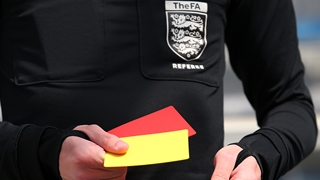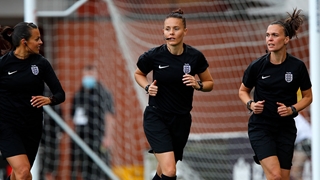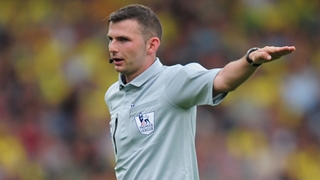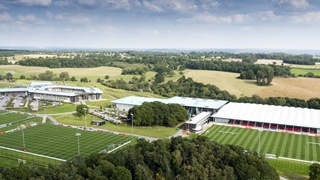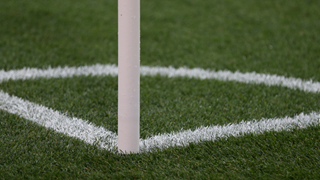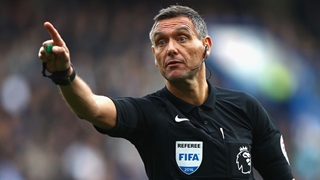
1. What does a referee do?
A referee is appointed to a football game in order to apply the Laws of the Game so that it is played fairly and safely. A referee must be confident, assertive and fair in order to successfully control the game.
For more information on the responsibilities of a referee, consult the law 5 of the Laws of the Game.
A qualified referee much affiliate with his or her local County Football Association each season.
2. How can I become a referee?
Anyone can become a referee with The FA granted that you are at least 14-years-old and a resident of England.
To train as an FA-qualified referee, you need to undertake a basic referees course with your local County FA. To find a course near you, click here. Alternatively, you can contact your County FA directly.
For more information on what you need to do to become a referee and what the Basic Referees Course entails, see the document at the bottom of the page for more specific FAQs.
3. How can I become the next top referee?
To become a top referee at the Premier League and international level, it takes talent, dedication, experience and fitness.
Referees in the Select Group (those who officiate on the Premier League) all started out on a basic referees course. Over time, they have been successfully promoted through the ranks from grassroots level, through semi-professional level, up to the Football League and beyond.
If you show enough drive, determination, fitness and talent, there is no reason why you couldn’t achieve the top level of refereeing.
4. What is the role of the assistant referees and the fourth official?
At the local park level, a football game may only be officiated by a referee in the middle and two club assistant referees.
However, at the semi-pro and professional level of the game, all matches will have four officials: the referee, two assistant referees and a fourth official.
The assistant referees
The assistant referees assist the referee to control the match in accordance with the Laws of the Game. They have particular responsibility for when the whole of the ball leaves the field of play to determine:
- Which team is entitled to a goal kick, corner kick or throw-in
- When a player may be penalised for being in an offside position
- When misconduct or any other incident occurs outside of the view of the referee.
Click here for the latest FAQs for assistant referees for season 2014-15
The fourth official
The fourth official assists the referee to control the match in accordance with the Laws of the Game and officiates if any of the three other match officials (referee or assistant referees) is unable to continue. S/he has specific responsibilities for:
- Controlling the occupants of the technical area
- Assisting with substitution procedures during the match
- Assisting with any administrative duties before, during and after the match, as required by the referee.
5. Who looks after referees and appoints them to games?
Each competition will have an appointing authority which is responsible for selecting referees at the various levels of the game. For FIFA World Cup matches the appointing authority is FIFA, while UEFA Champions League appointments are made by UEFA. In England, the Premier League and Football League appointments are made by the Professional Game Match Officials Ltd (PGMOL) who are a separate company jointly owned by The FA, the Premier League and Football League. They manage refereeing at the elite level of the English game.
Semi-professional refereeing is co-ordinated by The Football Association, which is responsible for the appointments and management of Panel referees (Level 2a and 3b referees on the Football Conference) and Contributory League referees (Level 3 referees on Step 3 & 4 Leagues).
Below this, the management of refereeing is the responsibility of the County FA in which the referee resides whilst the appointments can be made by the individual competitions or centrally at the County depending on their local arrangements.
6. What are the Laws of the Game?
The Laws of the Game for 11v11 are set by the International Football Associations Board, which features representatives from the football associations of England, Scotland, Wales, Northern Ireland and FIFA.
These laws are followed in every country of the world that is affiliated to FIFA. Amendments are made to the Laws for each season. Every referee must apply the Laws of the Game in every game of 11v11 football that is played.
FIFA compose the Laws of the Game for Futsal and these are updated at least every other season. The FA writes its own Laws of the Game for small sided football, which are applicable in England.
7. What is considered a yellow card offence?
A player is cautioned and shown the yellow card if he commits any of the following offences:
- Unsporting behaviour
- Dissent by word or action
- Persistent infringement of the Laws of the Game
- Delaying the restart of play
- Failure to respect the required distance when play is restarted with a corner kick, free kick or throw-in
- Entering or re-entering the field of play without the referee’s permission
- Deliberately leaving the field of play without the referee’s permission
- Fouls and misconduct are covered more extensively in Law 12 of the Laws of the Game
8. What is considered a red card offence?
A player, substitute or substituted player is sent off if he commits any of the following seven offences:
- Serious foul play
- Violent conduct
- Spitting at an opponent or any other person
- Denying the opposing team a goal or an obvious goalscoring opportunity by deliberately handling the ball (this does not apply to a goalkeeper within his own penalty area)
- Denying an obvious goalscoring opportunity to an opponent moving towards the player’s goal by an offence punishable by a free kick or a penalty kick
- Using offensive, insulting or abusive language and/or gestures
- Receiving a second caution in the same match
- A player, substitute or substituted player who has been sent off must leave the vicinity of the field of play and the technical area
- Fouls and misconduct are covered more extensively in Law 12 of the Laws of the Game
9. What are the different refereeing levels?
- Level 1 – National List (Football League and Premier League)
- Level 2a – Panel Select (Conference Premier)
- Level 2b – Panel (Conference North and South)
- Level 3 – Contributory (Contributory Leagues)
- Level 4 – Supply ( Supply Leagues)
- Level 5 – Senior County (County Leagues)
- Level 6 – County (County leagues)
- Level 7 – Junior (Amateur leagues)
- Level 8 – Youth (Junior Referee below age of 16)
- Level 9 – Trainee
10. How can I get a new Three Lions badge?
All qualified referees receive a Three Lions badge along with their certificate when they complete their first six games. If you wish to purchase additional badges, send a cheque for £5 per badge made payable to ‘The Football Association’.
Enclose a note of the address to where you’d like the badge(s) posted and also your RA-FA number. Post to the following address:
RA-FA
Refereeing Department
The Football Association
Wembley Stadium
PO Box 1966
London
SW1P 9EQ


